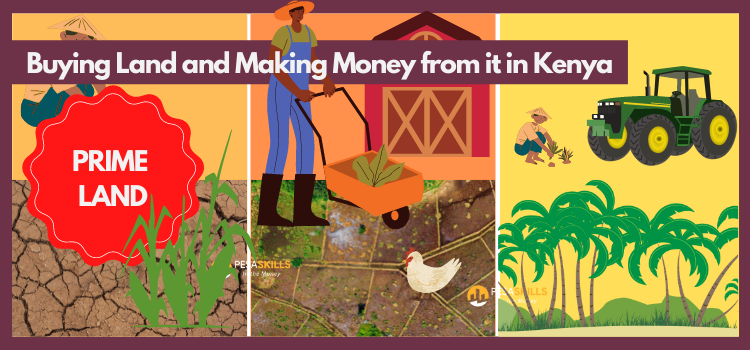Let’s go over a few facts before diving into buying and making money out of your land in Kenya.
Kenya has very expansive land. Official government reports say there are about 582,646 km² of land with 11,230 km2 being completely covered with water.
Out of this total land, about 18% is prime for agricultural activities, while the rest falls under the Arid and Semi-Arid categories.
The table below shows the Agro-ecological categories (zones) of land in Kenya.
The Agro-ecological category will determine how good land is for agricultural purposes.
| Categorization | Area in Hectares | Area in Acres | Area in Km2 | % Against total land |
| Water | 1,560,000.02 | 3,854,844 | 15,600 | 2.6 |
| Arid Land | 30,000,000 | 74,131,614.4 | 300,000 | 52.9 |
| Semi-arid Land | 4,820,000 | 11,910,479 | 48,200 | 8.5 |
| Medium Potential | 5,300,000 | 13,096,585 | 53,000 | 9.2 |
| High Potential | 5,300,000 | 13,096,585 | 53,000 | 9.2 |
| Agro-alphine | 80,000 | 197,684 | 800 | 0.1 |
Adapted from Sombroek, et al., 1982.
Some other key details are that the total Arid and Semi-arid land is just around 85 million hectares (about 350,000 km2) and out of this about half is useful for nomadic pastoralism.
The other half can be used for agriculture but would need additional effort in terms of irrigation and soil or crop treatment and care.
Around 7 million out of the 53.77 million Kenyans occupy arid and semi-arid lands.
Most of the other population is spread throughout the country and in other ecological categories.
The regions with the most fertile land for farming in Kenya are Central Kenya especially the Mount Kenya region, Western Kenya around the highland areas nearing Lake Victoria, and the Coast region.
Lastly, you should know that not all land parcels carry a Title Deed, some pieces are sold on the basis of ownership certificates or even squatter-like agreements.
Two forms of Title Deed exist. Kenyan Citizens often have a Freehold Title Deed which has an indefinite limit on the amount of time land can be held. Foreigners owning land in Kenya are mostly accorded the Leasehold Title Deed which limits their ownership to a maximum period of 100 years.
Now, let’s look at land as an investment.
Is buying land a good investment in Kenya?
Buying land is a good investment in Kenya because, first, in general land is an appreciating asset. HassConsult and Cytonn found land went up in value by 2.8% in 2021.
Second, as a Kenyan citizen chances are that you will also have a freehold Title Deed with an indefinite ownership term.
Lastly, Kenya has been rapidly developing making land gain high demand, especially around Urban and Suburban areas of major towns including Nairobi, Thika, Nakuru, Eldoret, Kisumu, and Mombasa.
That said, when assessing between a good and bad investment, it is always a question of what other uses you have for your money at the time. (Please consult a financial advisor for sound advice on where to make investments).
How do Kenyans make money on land?
There are several ways that Kenyans make money from their land including farming (crops and animals), leasing out to other users, constructing rental housing, planting trees, and building commercial establishments.
In farming, there are extensive ways in which you can make money.
One example is Kenyans who buy large tracts of land in Rift Valley (over 10 hectares) and plant maize. Due to the fact the region is good for the crop, there are guaranteed profits every harvest season provided the process is done right.
The same goes for potato farming in Nyandarua and Kinangop, Maize in Bungoma and other Western areas, Bananas in Kisii, etc.
You could also lease out the land. Leasing mostly works with large pieces in rural Kenya or small pieces in Urban areas.
On large pieces, there are always individuals willing to farm but do not have the land so they can take on short leases of about 3 years at good rates. If you have idle land or lack the capital to farm your land, you can consider this option.
For small pieces of land in Kenya, the most common leasing happens with corporations looking for prime places to set up their operations.
Petrol stations (Gas stations) are a very common example of urban land leasing in Kenya. They take on long-term leases of more than 5 years with renegotiation clauses.
Land in Kenya can also generate income via the construction of rental units. For this option, as long as you are in a populated area with limited housing, there is no downside. Urban areas are particularly prime for setting up rental units. The only challenge is that construction is capital intensive and may take a long time to pay itself off and earn profits.
Another use of land in rural Kenya that generates income is tree planting. It is like a form of farming but just long-term.
There are specific types of trees used in construction such as pinewood and often these take a few years to mature.
You may consider planting them and just waiting until they are ready to sell. Given the booming construction industry in Kenya, trees will be in high demand even in the coming decades.
Also, some landowners use trees to hold space in empty land (conceal idle space) to avoid possible infringement or takeover of their parcels.
Lastly, you can consider a commercial establishment in case your land is in a high-traffic area. There are unlimited alternatives for this considering people even hire out the land for events in neighborhoods where open land is not readily available.
Is land investment profitable?
A lot of Kenyans buying land will ask this question.
The truth is that land can be profitable depending on where it is located and its potential use. This is when we consider profits as strictly money that you get on top of your initial investment.
For example, if you buy land near a developing area there are chances that it will appreciate in value more than the average market rates.
There are cases where people for instance bought land in Juja and Ruiru areas for Kshs. 150,000 per plot (50 by 100) and after 6 years the land is now worth Kshs. 1,500,000 per plot.
The problem with buying for speculation is that in some places, due to lack of development or any changes in land use, the prices remain the same or appreciate below market rates making it hard to even dispose of the parcel.
Is land a form of passive income?
This is one of those questions whose answer is Yes and No.
The definition of passive income that we consider here is the form of income that you earn from an investment in which you put very little or no effort to run.
Why Yes?
Land in business terms falls in the category of assets. An asset is something that has value and that you own. In a general view, an asset can be gaining value or lose value with time. The gain in value is one way to view land as a passive income.
Gaining value in time
Land often gains value over time which is why most people in Kenya buy it for speculative value. A simple example is getting a plot of land somewhere near a possible development (like a road) and waiting for the value to go up.
There are some cases where the value of land has more than doubled in Kenya and the owners thus gained more than 100% profit on their investments.
In the case of gaining value, and when land is treated as an asset that generates profit, then the land is a source of passive income. This is especially for those individuals already described above who buy land with a speculative motive. Again, land bought under speculative motive is often held by the owner simply for its ability to generate a profit.
Why Not?
While the speculative motive is a big reason why individuals buy land, it is not the only reason. In the context of Kenya, people buy land to offer a form of inheritance to their children, for non-commercial development, and even for subsistence farming.
Land held under the non-speculative motive is thus not a source of passive income (in the strict definition of the term passive income). This would happen when you also do not expect to dispose of the land at a higher value than you bought it.
Land losing value?
In some rare cases, it is possible for land to lose value. Just like other assets whose value depreciates over time. Land can lose value in the case where natural disaster damages the orientation of the landscape when a neighborhood becomes undesirable or inhabitable or even when legal issues emerge regarding ownership.
It is necessary to mention that land can lose value whether being held as a source of income or for other non-commercial reasons.
So, is land really a form of passive income? Yes and No.
How about investing in the land around the Nairobi Metropolitan region?
Nairobi is the capital of Kenya and therefore land prices are relatively high in comparison to other areas.
The average price of a 0.115 acres plot (50 by 100 feet or 5,000 sq ft.) in a good neighborhood in Nairobi is Kshs. 7.2 million.
Based on listings by Kenya Property Center the most expensive piece of land in Nairobi was worth Kshs 290 million while the cheapest piece – in a good area – is around Kshs 7 million.
The list below shows some of the prime areas to buy land around Nairobi considering the high appreciation rates reported by HassConsult and Cytonn in their reports.
| Area near Nairobi | The average price for 43560 sq ft. (1 hectare) | Appreciation rate per annum (in %) |
| Ruiru | 23,200,000 | 3.1 |
| Ongata Rongai | 18,900,000 | 2.8 |
| Ngong | 19,000,000 | 2.9 |
| Mlolongo | 24,600,000 | 3.26 |
| Limuru | 20,500,000 | 3.1 |
| Kitengela | 11,300,000 | 2.1 |
| Kiserian | 7,300,000 | 1.8 |
| Kiambu | 43,900,000 | 3.6 |
| Juja | 11,400,000 | 2.42 |
| Athi River | 11,700,000 | 2.6 |
| Tigoni | 21,600,000 | 3.0 |
| Thika | 18,000,000 | 2.89 |
| Syokimau | 21,100,000 | 4.21 |
| Ruaka | 83,100,000 | 5.32 |



















